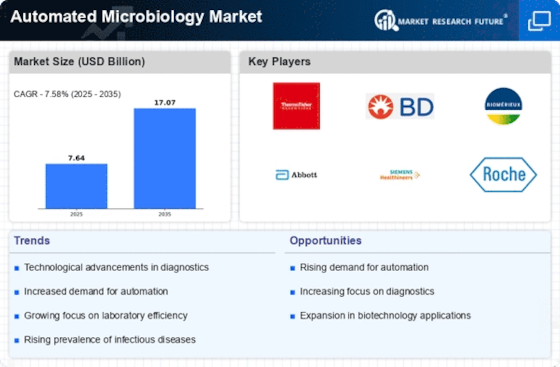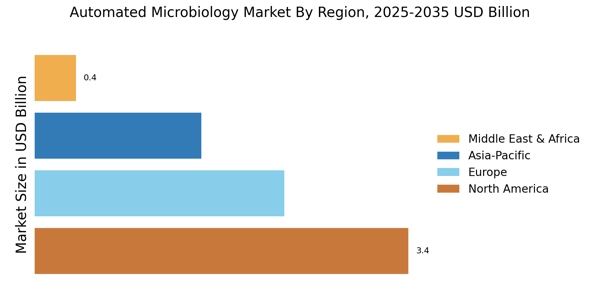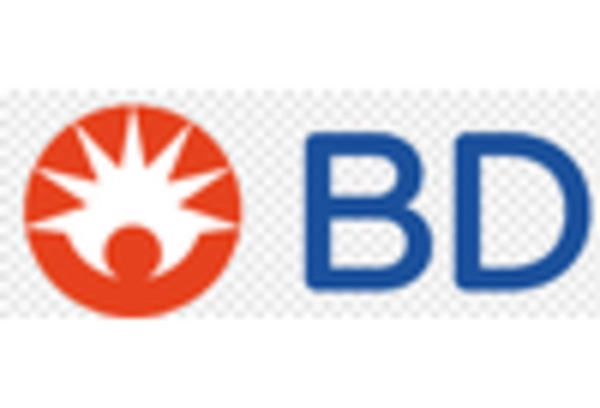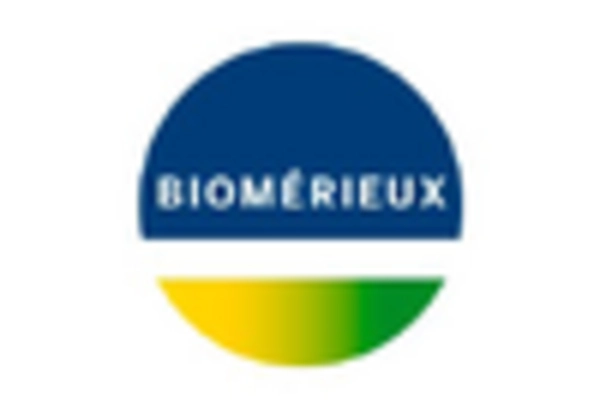Regulatory Support for Automation
Regulatory support for automation in microbiology is emerging as a key driver of the Automated Microbiology Market. Governments and regulatory bodies are increasingly recognizing the importance of automation in enhancing laboratory efficiency and accuracy. This support is reflected in the establishment of guidelines and standards that promote the adoption of automated systems in clinical laboratories. For instance, regulatory agencies are encouraging the use of automated microbiology solutions to streamline testing processes and ensure compliance with quality standards. Market data suggests that regions with robust regulatory frameworks are witnessing faster adoption rates of automated technologies. As regulatory support continues to grow, the Automated Microbiology Market is likely to experience accelerated growth, as laboratories seek to align with these standards and improve their operational capabilities.
Rising Demand for Rapid Diagnostics
The increasing need for rapid diagnostics in healthcare settings is a primary driver of the Automated Microbiology Market. As healthcare providers strive to enhance patient outcomes, the demand for quick and accurate microbial identification has surged. This trend is particularly evident in clinical laboratories, where the need for timely results can significantly impact treatment decisions. According to recent data, the market for rapid diagnostic tests is projected to grow at a compound annual growth rate of over 10% through the next few years. This growth is likely to be fueled by advancements in automation technologies that streamline workflows and reduce turnaround times, thereby enhancing the efficiency of laboratory operations. Consequently, the Automated Microbiology Market is positioned to benefit from this rising demand, as automated systems can provide faster results compared to traditional methods.
Increased Focus on Infection Control
The heightened emphasis on infection control measures across various sectors is driving the Automated Microbiology Market. Organizations, particularly in healthcare, are increasingly adopting automated microbiology solutions to monitor and manage infections effectively. This trend is underscored by the growing awareness of the impact of healthcare-associated infections (HAIs) on patient safety and hospital costs. Data indicates that HAIs affect millions of patients annually, leading to extended hospital stays and increased healthcare expenditures. As a result, healthcare facilities are investing in automated systems that facilitate rapid microbial detection and susceptibility testing, thereby improving infection control protocols. The Automated Microbiology Market stands to gain from this focus, as automation enhances the accuracy and speed of microbial analysis, ultimately contributing to better infection management.
Technological Innovations in Automation
Technological innovations play a crucial role in shaping the Automated Microbiology Market. The advent of advanced automation technologies, such as artificial intelligence and machine learning, is revolutionizing microbiological testing processes. These innovations enable laboratories to enhance their operational efficiency, reduce human error, and improve the accuracy of test results. For instance, automated systems equipped with AI algorithms can analyze complex data sets and provide insights that were previously unattainable. Market data suggests that the integration of such technologies could lead to a reduction in testing times by up to 50%, thereby significantly increasing laboratory throughput. As laboratories seek to optimize their workflows and meet the growing demand for microbiological testing, the Automated Microbiology Market is likely to experience substantial growth driven by these technological advancements.
Growing Investment in Healthcare Infrastructure
The expansion of healthcare infrastructure is a significant driver of the Automated Microbiology Market. As countries invest in modernizing their healthcare systems, there is a corresponding increase in the demand for advanced diagnostic tools, including automated microbiology solutions. This trend is particularly pronounced in emerging economies, where healthcare facilities are being upgraded to meet international standards. Data indicates that investments in healthcare infrastructure are expected to reach trillions of dollars over the next decade, creating a favorable environment for the adoption of automated systems. These investments not only enhance the capacity of laboratories but also improve the overall quality of healthcare services. Consequently, the Automated Microbiology Market is poised to benefit from this influx of capital, as healthcare providers seek to implement state-of-the-art technologies to improve patient care.

















